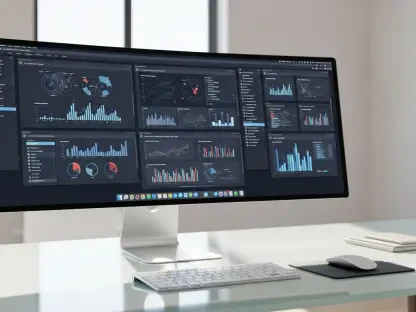Imagine a trusted tool for project management and workflow automation, used by countless teams to streamline operations, suddenly slated for discontinuation. This is the reality for users of Google Tables, a work-tracking platform that emerged as a competitor to Airtable but is now ceasing operations as of December 16 this year. With the shutdown imminent, businesses and individuals are grappling with the challenge of transitioning their data and processes. This roundup gathers diverse opinions, tips, and strategies from industry voices and tech experts to shed light on the implications of this closure, the migration options available, and the broader lessons for tech adoption in a dynamic landscape.
Exploring the Context and Impact of the Shutdown
What Led to the End of Google Tables?
The journey of Google Tables began with high hopes as an experimental tool from Google’s Area 120 incubator, aimed at revolutionizing project tracking through automation. Industry observers note that its initial promise was evident as it moved from beta to an official Google Cloud product within a short span. However, the consensus among tech analysts is that the tool struggled to carve out a sustainable niche in a crowded market of workflow solutions.
A significant factor in its discontinuation, according to many experts, lies in the restructuring of Area 120 over recent years. Reports indicate that the incubator faced substantial cutbacks, shifting focus to AI-driven initiatives and reducing support for standalone projects. This strategic pivot within Google left tools like Tables vulnerable, as corporate priorities moved toward more integrated platforms.
Some commentators argue that the shutdown reflects a broader tension between innovation and profitability in large tech firms. While experimental tools often ignite excitement, their long-term viability can be questioned if they fail to align with overarching business goals. This perspective raises critical questions about how companies balance creativity with practical sustainability.
How Are Users Affected by This Change?
The immediate impact on users centers on the urgent need to migrate data before the December deadline. Tech consultants emphasize that the loss of Tables’ unique automation features poses a challenge for teams accustomed to its tailored workflows. Small businesses, in particular, may feel the strain of adapting to new systems under tight timelines.
On the flip side, some industry voices suggest that this closure could spur positive change by pushing users toward more robust alternatives. The opportunity to explore platforms with broader scalability is seen as a silver lining, though not without initial hurdles. The diversity of opinions highlights the varied experiences among user groups, from frustration to cautious optimism.
Concerns also linger about data integrity during migration. Experts in data management caution that while Google has provided tools to ease the transition, there’s no guarantee of seamless compatibility with existing setups. This uncertainty underscores the need for thorough planning and backup strategies to mitigate potential disruptions.
Migration Options and Expert Recommendations
What Are the Suggested Pathways for Users?
Google’s official guidance points users toward exporting data to Google Sheets or migrating to AppSheet, a no-code platform with advanced features. Tech advisors widely agree that AppSheet offers a compelling alternative due to its integration with Google Workspace and its capacity for custom app development. A migration tool designed to preserve formatting and data relationships has been highlighted as a key resource.
However, opinions differ on the ease of this transition. Some consultants warn that feature parity between Tables and AppSheet isn’t assured, particularly for complex automations. They advise users to conduct pilot tests with smaller datasets before fully committing to the new environment, ensuring critical workflows remain intact.
A recurring tip from industry blogs is to leverage this moment for a broader reassessment of workflow tools. Rather than settling for the immediate Google-provided options, businesses are encouraged to explore third-party platforms that might better suit their needs. This proactive approach could turn a forced change into a strategic upgrade.
Are There Broader Alternatives to Consider?
Beyond Google’s ecosystem, the no-code and low-code space is brimming with alternatives, and experts are quick to point out viable competitors. Platforms like Airtable and Notion are frequently cited for their flexibility and user-friendly interfaces, offering robust solutions for project management and data organization. These options are seen as strong contenders for users seeking familiarity with Tables’ functionality.
Differing views emerge on whether staying within Google’s suite is the safer bet. Some tech strategists argue that sticking with AppSheet ensures better compatibility with existing Google tools, minimizing learning curves. Others counter that branching out to independent platforms could provide more tailored features, free from the risk of future corporate discontinuations.
A balanced perspective suggests a hybrid approach: using AppSheet for immediate needs while piloting other tools for long-term fit. This strategy, endorsed by several workflow consultants, allows for flexibility and reduces dependency on a single provider. It’s a pragmatic way to navigate the uncertainty surrounding such transitions.
Strategic Insights on Google’s Direction
What Does This Say About Innovation at Google?
The discontinuation of Tables has sparked a wider discussion among tech analysts about Google’s approach to innovation. Many see this as emblematic of a shift toward consolidation, where only tools with broad applicability or strategic importance survive. This trend is viewed as a pragmatic move to streamline resources in a competitive tech environment.
Contrasting opinions highlight a potential downside to this strategy. Some industry critics argue that axing experimental projects risks stifling creativity and alienating early adopters who invest in niche tools. They question whether Google’s focus on scalable platforms might overlook unique user needs that smaller projects often address.
A middle ground emerges from thought leaders who suggest that Google’s incubator model may need recalibration. Rather than fully dismantling experimental initiatives, a tighter alignment with core products from the outset could prevent such abrupt closures. This insight points to a possible evolution in how tech giants nurture innovation without sacrificing stability.
How Should Users Adapt to Corporate Tech Shifts?
Adapting to sudden changes like the Tables shutdown requires a forward-thinking mindset, according to productivity experts. A common recommendation is to build redundancy into tech stacks, ensuring that no single tool becomes indispensable. This approach mitigates the impact of future discontinuations or policy shifts by large providers.
Another piece of advice focuses on staying informed about corporate roadmaps. Tech commentators urge users to monitor announcements and updates from providers like Google to anticipate changes early. Engaging with user communities and forums is also suggested as a way to share experiences and crowdsource solutions during transitions.
Differing perspectives exist on the role of advocacy. While some experts believe users should push for extended support or feature integration in successor tools, others see such efforts as futile against corporate decisions. Instead, they advocate for agility—quickly pivoting to new solutions rather than dwelling on what’s lost.
Reflecting on the Roundup and Next Steps
Looking back, this roundup revealed a spectrum of reactions to the Google Tables shutdown, from concern over migration challenges to optimism about exploring new platforms. The discussions captured varied expert opinions on Google’s strategic shifts, with debates on balancing innovation and sustainability proving particularly insightful. User experiences, too, painted a complex picture of adaptation in the face of change.
Moving forward, the actionable takeaway is clear: users need to act swiftly to export data and test migration tools like AppSheet while considering external alternatives for long-term needs. Businesses are advised to use this transition as a catalyst for reevaluating their tech dependencies, building more resilient systems. Staying proactive, informed, and flexible emerges as the cornerstone for navigating such corporate tech evolutions, ensuring minimal disruption in an ever-shifting digital landscape.









